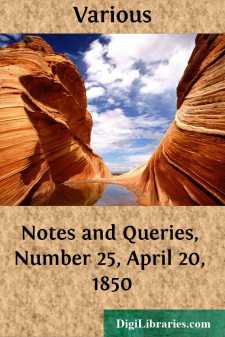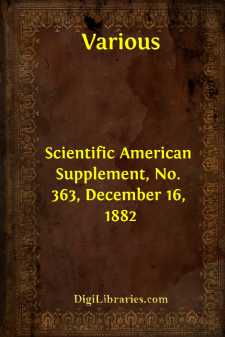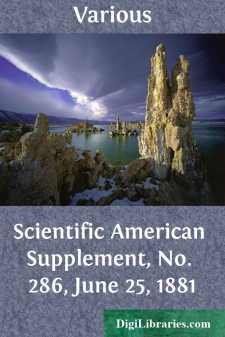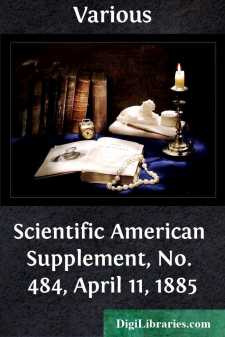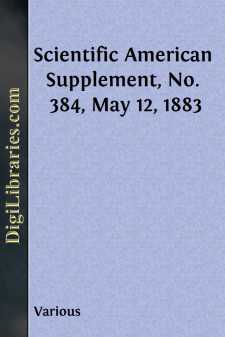Categories
- Antiques & Collectibles 13
- Architecture 36
- Art 48
- Bibles 22
- Biography & Autobiography 813
- Body, Mind & Spirit 142
- Business & Economics 28
- Children's Books 14
- Children's Fiction 11
- Computers 4
- Cooking 94
- Crafts & Hobbies 4
- Drama 346
- Education 46
- Family & Relationships 57
- Fiction 11828
- Games 19
- Gardening 17
- Health & Fitness 34
- History 1377
- House & Home 1
- Humor 147
- Juvenile Fiction 1873
- Juvenile Nonfiction 202
- Language Arts & Disciplines 88
- Law 16
- Literary Collections 686
- Literary Criticism 179
- Mathematics 13
- Medical 41
- Music 40
- Nature 179
- Non-Classifiable 1768
- Performing Arts 7
- Periodicals 1453
- Philosophy 64
- Photography 2
- Poetry 896
- Political Science 203
- Psychology 42
- Reference 154
- Religion 513
- Science 126
- Self-Help 84
- Social Science 81
- Sports & Recreation 34
- Study Aids 3
- Technology & Engineering 59
- Transportation 23
- Travel 463
- True Crime 29
Notes and Queries, Number 25, April 20, 1850
by: Various
Categories:
Description:
Excerpt
NOTES.
ROGER BACON: HINTS AND QUERIES FOR A NEW EDITION OF HIS WORKS.
Victor Cousin, who has been for many years engaged in researches on the scholastic philosophy, with the view of collecting and publishing such of its monuments as have escaped the diligence of scholars, or the ravages of time, has lately made the discovery in the library at Douay of a copy of an inedited MS. of Roger Bacon, entitled Opus Tertium, of which but two or three other copies are known to exist; and has taken occasion, in some elaborate critiques, to enter, at considerable length, into the history and character of Roger Bacon and his writings. The following is a summary of part of M. Cousin's observations.
The Opus Tertium contains the author's last revision, in the form of an abridgment and improvement, of the Opus Majus; and was drawn up at the command of Pope Clement IV., and so called from being the third of three copies forwarded to his holiness; the third copy being not a fac-simile of the others, but containing many most important additions, particularly with regard to the reformation of the calendar. It also throws much light on Bacon's own literary history and studies, and the difficulties and persecutions he had to surmount from the jealousies and suspicions of his less-enlightened contemporaries and rivals. The Opus Tertium, according to the sketch given of its contents by Bacon himself, is not complete either in the Douay MS. or in that in the British Museum, several subjects being left out; and, among others, that of Moral Philosophy. This deficiency may arise, either from Bacon not having completed his original design, or from no complete MS. of this portion of his writings having yet been discovered. M. Cousin says, that the Opus Tertium, as well as the Opus Minus, is still inedited; and is only known by what Jebb has said of it in his preface to the Opus Majus. Jebb quotes it from a copy in the Cottonian Library, now in the British Museum; and it was not known that there was a copy in France, till M. Cousin was led to the discovery of one, by observing in the Catalogue of the public library of Douay, a small MS. in 4to. with the following title, Rog. Baconis Grammatica Græca. Accustomed to suspect the accuracy of such titles to MSS., M. Cousin caused a strict examination of the MS. to be made, when the discovery was communicated to him that only the first part of the MS. consisted of a Greek grammar, and that the remaining portion, which the compiler of the Catalogue had not taken the trouble to examine, consisted of many fragments of other works of Bacon, and a copy of the Opus Tertium. This copy of the Opus Tertium is imperfect, but fortunately the deficiencies are made up by the British Museum copy, which M. Cousin examined, and which also contains a valuable addition to Chapter I., and a number of good readings.
The Opus Majus, as published by Jebb, contains but six parts; but the work in its complete state had originally a seventh part, containing Moral Philosophy, which was reproduced, in an abridged and improved state, by the renowned author, in the Opus Tertium....


